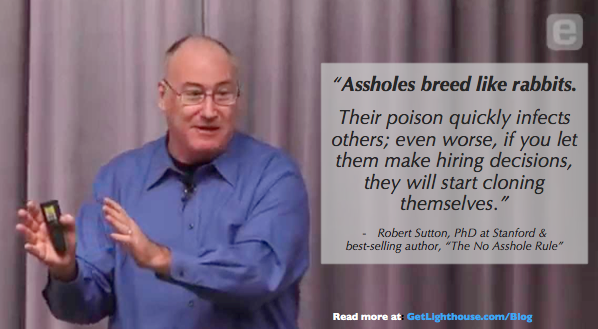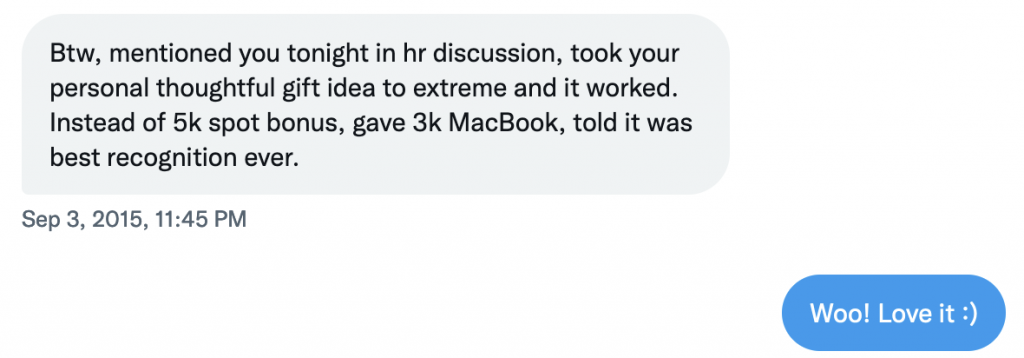"If you care about someone, and you got a little love in your heart, there ain't nothing you can't get through together."
Ted Lasso has had many amazing quotes throughout the Apple TV hit show's run that are often a mix of quirky, fun, and memorable.
The Lighthouse team loved season 1 of Ted Lasso in particular. Not only was it funny, quirky, and something a bit different, it provided many great examples of leadership we were excited to see demonstrated on a mainstream TV show.
When at my team's suggestion I finally watched season 1, I knew we had to write it about it for the Lighthouse blog. That's why last year you saw our post, "4 Ted Lasso Leadership Lessons You Can Apply."
In it we saw that Ted demonstrated key leadership skills like:
- Building rapport with everyone you work with
- Giving small, thoughtful gifts to show your appreciation and recognize someone
- Applying the no a**hole rule to protect your team & culture
- Getting great ideas from your team by truly listening to them
With such a fun (and often funny) story line and these great lessons, I was super excited to dive into season 2.
Unfortunately, I was left very disappointed.
Led Tasso - Season 2's "what not to do" mascot
In episode 3 of Season 2 we meet Ted Lasso's alter ego, "Led Tasso." As you can see in the video above, the cheerful, caring leader is replaced by a loud, bossy, jerk.
Much like that character being the antithesis of Ted Lasso's personality, Season 2 saw massive reversals in Ted's leadership skills, leading me to scratch my head. The show suddenly had more bad examples of how to lead than good ones.
While the season had some solid messages on the importance of taking care of your mental health, and some subversive plot lines you don't always see, the examples set and the way the plot developed was crushing to me.
It's rare to see great leadership in popular culture, so it's sad to see it disappear on a show that was previously such a shining example of good management lessons.
That's why today's post is a take down of Season 2 and the anti-lessons you can learn from it, because sometimes what *not* to do is the best teacher.
4 Led Tasso anti-leadership lessons you should avoid (and what to do instead)
Like Ted's infamous character he used when he needed to really spark his team, we're treating this post like opposite day.
With each of these lessons, we're going to share a key anti-leadership lesson, a clip or shot from the show, and then help you understand what to do instead.
With that in mind, here's the Ted Lasso management lessons you can learn from Season 2:
- No one likes a jerk.
- Never fraternize with your employees, especially subordinates.
- When telling a story, show, don't tell.
- Money is not the best gift.
1) No one likes a jerk.
One of the lovable stories of season 1 is seeing the timid equipment manager Nate come into his own. With Ted's encouragement he makes some key suggestions that help improve the team, and you see his confidence grow throughout the season, as well as the team grow in respect for him.
Then the writers murdered his character, by killing his character.
In Season 2, Nate is a textbook a**hole. He verbally spars with players. He's egotistical and cocky. He betrays Ted to the press for no reason, biting the hand that had just taken a chance on him. And the team rightfully hated him for it.

The Ted Lasso Leadership Mistake:
First and foremost, being a jerk and egotistical is a great way to make everyone hate you from peers to direct reports.
While they showed for no clear reason that Nate has failed upward into becoming a coach of a rival team (likely done out of the need for a "villain" on the show), a**holes usually eventually run out of leeway for their behavior.
That's why so often assholes have shorter stints at any given job; at some point the results aren't worth it.
And there's research to back this up. A report from Harvard Business School has outlined the real cost of assholes or toxic employees:
"In comparing the two costs, even if a firm could replace an average worker with one who performs in the top 1%; it would still be better off by replacing a toxic worker with an average worker by more than two-to-one."
What you should do instead:
As a leader, definitely never become a total jerk. However, also recognize that unlike Ted who did nothing about Nate's behavior (which was bizarre, because even his trusted assistant kept telling him to), you also owe to the rest of your team to swiftly deal with that kind of behavior.
If AFC Richmond were real, then the best thing Ted could have done is had a frank, clear conversation with Nate about his behavior, and encouraged him to change his behavior, or let him go much sooner. Nothing was gained by having him wait it out.
Further reading:
- A jerk on your team can help cause the worst thing: Learned Helplessness. Learn how to prevent or fix it here.
- Learn more straight from the book all about it in Bob Sutton's The No Asshole Rule
- And if you have a jerk you want to fix, try our battle-tested, step-by-step guide: "How to motivate an underperforming employee".

2) Don't fraternize with your employees, especially subordinates
This should be obvious for a lot of reasons, but it's still worth remembering: you can't date, hit on, sexually harass, or otherwise fraternize with your employees as a senior leader. This is especially true with direct subordinates, regardless of your level in a company.
Remember: You can get in serious trouble for sexual harassment and other legal violations in your state or region.
That means not only being fired, but potentially legally charged and having a scarlet letter on your resume that destroys the rest of your life.
The reason this is so universally frowned upon is that it creates an awkward power dynamic.
The Ted Lasso Leadership Mistake:
This time it wasn't Ted breaking the rules but the owner, Rebecca. In the show, she accidentally went on a blind date with one of her players, Sam. Instead of sticking to her guns and leaving as soon as they realized what happened, she engaged in the relationship.
Things get complicated when Sam is given the chance to join another team, and his judgment is clearly clouded by his relationship. It also impacts Rebecca, who probably could have brought in helpful capital to the organization if she agreed to the transfer.
Even if it's consensual (which if it's a direct report, coercion can always be argued), you can't let a relationship cloud your judgement as an executive.
And equally important, you can't fire someone for breaking up with you, so if it doesn't work out, you've created a very awkward situation that can make your workplace untenable.
What you should do instead:
This video from Dick Costolo is one of my all time favorite leadership talks. It's well worth the 6 minutes and 49 seconds to watch.
As he says in the video, the most important thing you can do as a leader is, "Care deeply about your team, but not what they think of you."
By necessity, to maintain your objectivity and the standing as their leader you need to keep a slight distance from your team. You need to care greatly about supporting them and giving them what they need, while not letting your judgment be clouded by worrying about their opinion of you.
Obviously there's no deeper example of caring what they think of you than if you become romantically involved, so in addition to avoiding HR violations that can derail your entire career, remember it ruins the leadership dynamic with your team.
The proper move for Rebecca would have been to go home and maintain a professional distance with Sam, while apologizing for the mistake they both could not have controlled since the date was blind. Even then, it was still awkward that the owner of the team was on the same dating app as him and is why many apps today allow you to connect your Linkedin to avoid coworker matching.
Further reading:
- One of the best ways to care deeply about your team is to build rapport with them. Learn over 100 ways to do so here.
- Another key way to drive loyalty and appreciate your team is to help them grow. Here's how you can help your team achieve their goals.
3) When telling a story, show don't tell.
As a fan of great films, and deep, thoughtful television series like the Wire and Breaking Bad, it really disappoints me when shows resort to simply telling you things, instead of showing the story evolve.
Unfortunately, in Season 2 of Ted Lasso, they resorted to simply telling you things happened constantly. Stuff just happened all season. Rarely did they show you the action or most importantly WHY something happened.
- They never showed Nate meeting with the rival club he left for. He just appeared as the coach out of nowhere in the finale.
- The team lost 5-0 in a big game (video above), but there was no explanation for why they'd do THAT poorly. (Partied night before, team ill prepared, sabotage, etc)
Sadly, this kind of writing is all too common on TV. This made it all the more disappointing when Season 1 went to great effort to show Ted getting buy in from his team, and slowly learning and growing, then Season 2 stopped doing this.
The Ted Lasso Leadership Mistake:
Some of the best scenes in Season 1 involved Ted sharing a key anecdote, lesson, or story that helped inspire and motivate the team. In Season 2 these were sorely lacking and the belief in Ted as a leader evaporated with that.
As a leader, it's important to remember that people remember stories the best.
Think about the difference between Ted Lasso saying to Sam, "Just forget that play with Jamie" and the goldfish story above. Which do you think is more memorable?
What you should do instead:
As this great TEDx Talk above explains, a story is a powerful tool:
- It can make you associate more value to an object, like a watch that you saw James Bond wear in a movie.
- It activates the emotional part of your brain, instead of only the rational brain when you only have basic facts and details.
- They create dopamine and other hormones in your brain that make you more interested and engaged in the story, as well as more open and collaborative.
As a manager, you should thus be using stories to:
- Make your messages resonate more with your team
- Help the person you talk to better remember what you tell them
- Improve your feedback and coaching of your team
You may think that, "The end result is the same! I can tell them a story and then ask them to do X, or I can just ask them to do X." Yet, that's not true. Just like a TV show is more satisfying when they show something happening instead of telling, the same is true when you work with your team.
Further Reading:
- Learn more about the power of storytelling in Harvard Business Review here
- Learn how to give quality feedback that includes sharing stories of what your team needs to improve:
4) Money is not the best gift.
One of the moments in Season 2 that made my jaw drop the most (and not in a good way) was the final scene between Ted Lasso and Dr Sharon, the team psychologist.
At the very start of the clip above, he references a cash gift he gave her in a basic envelope, because he says that money is the best gift.
I was shocked. It was at that moment I decided I would have to write this follow up post about alll the mistakes made in the second season. It also made me start to wonder if the writers had changed from Season 1 to Season 2 (it appears not, but something seems to have changed in the writer's room).
The Ted Lasso Leadership Mistake:
Cash is not just the wrong gift in most situations. It also goes against one of the best Ted Lasso management lessons from Season 1:
- Buying books personalized for every player on the team
- Giving Sam (video above) a bunch of birthday gifts that remind him of home when he was homesick
- Buying a nice suit for Nate when he needed it
Some of the best, most genuine moments in the show came from those gifts.
After all the connection and personal work between Dr. Sharon and Ted, plus what Dr. Sharon did to help many of the players on AFC Richmond, it's shocking to think that the right gift would be an envelope of cash.
Even more important, thinking back on your own life, I bet you can remember some thoughtful gifts you've received as well. That's why great leaders know it's one of the best tools for a leader.
What you should do instead:
We've written many times on the Lighthouse blog, but it bears repeating: Money is not a particularly good motivator.
In fact, for creative roles, it's been shown to have a net negative impact on performance as this well-known TED Talk from Dan Pink shows.
Instead, you should be like Ted Lasso in Season 1 and give thoughtful gifts. As a friend DM'd me years ago when I first started evangelizing the idea, you really can go far with these gifts:

Yet, unlike my friend, who spent thousands on a MacBook for an engineer, you don't have to spend that much money.
Many of the best, thoughtful gifts cost you just a few dollars. All it takes is getting to know your team, so that you know what to get them, then seizing the right opportunity. And if you need ideas for this, our further reading has you covered.
Further Reading:
- Learn ways to motivate your team without breaking the bank
- Find out how you can motivate your team and keep them happy during a recession
- You can also use thoughtful gifts paired with praise to have a huge motivational impact

Led Tasso let us down. Season 2 was a collection of Ted Lasso management lessons to do the opposite of.
I had high hopes for Season 2 of Ted Lasso, but was left really disappointed.
And while I can get past the plot holes, contrived scenes, and bizarre episode featuring 3 pub friends, it's tragic to see a popular show waste an opportunity to continue teaching great leadership lessons.
While Season 1 taught us all great management lessons to remember, Season 2 went very Led Tasso and reversed things. Remember to do the opposite of what Ted Lasso showed us as a leader in Season 2, and you'll be on your way to being an effective leader.





